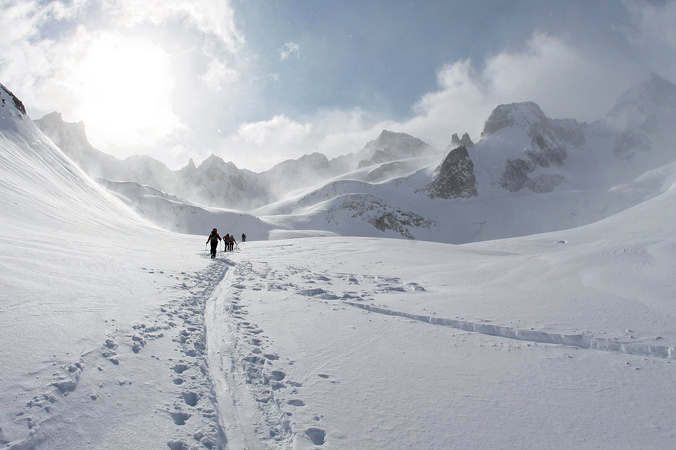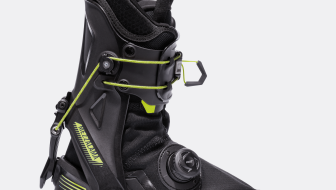In 2014 Kim Vinet, then a budding pro skier and tail ski guide, headed out on a trip at British Columbia’s Fairy Meadows Hut. On day six, the unthinkable happened when an avalanche killed a friend and member of her group. This is Kim’s story of intuition, trauma and finding her way back into the mountains when the illusion of safety has been shattered. Here is what she experienced in her own words.

A fog of calm near Fairy Meadows Hut, B.C. [Photo] Kim Vinet
I remember every vivid detail of sliding down the bed surface toward my friends. But I don’t remember taking off my pack or taking out my shovel—my training was taking over. The next thing I heard was “3.6 meters!” I remember thinking Nope! There’s no way this is happening. I paddled away the top meter of snow within about 20 seconds of getting there. “STRIKE!” I looked up and saw about three inches of a 3.2-meter probe sticking up above the snow on a diagonal strike. We left it in place and made a second, perpendicular strike. “We’ve got you!” I yelled. “Just hold on; we’re coming for you!”
It had been 21 minutes when we pulled her out of the snow. She wasn’t breathing. As a certified EMR, I had the training, and I knew “what to expect.” But no one tells you that you may be performing CPR on someone you know and love. Their body is real. Your relationship with them is real. The situation is so unbelievably surreal that you can’t humanly contextualize it. Something inside you shuts it out.
A helicopter arrived about an hour and a half after the avalanche and airlifted my friend to a hospital in Calgary. Late that evening, after having regained an unassisted heartbeat, she passed away from organ failure due to asphyxia.
On coming home, I had an emptiness I’d never felt before. When people asked about my trip, any answer I gave felt like a lie. I’d be lying if I said it was terrible—it was a fabulous adventure with incredible friends. I’d be lying if I said it was amazing—I lost a respected friend and a piece of myself: my ease and innocence in the mountains.
It took eight months and some pretty extenuating circumstances for me to return to the backcountry. For years, all I could do was suppress the pain of this incident. It’s hard to believe that an activity that provides so much joy could hurt me that deeply. I had always been respectful of the backcountry. I knew not to tempt fate. I’ve done all sorts of courses; I try to follow the rules; and I’m not reckless. But after that avalanche, my world is different from how it used to be.
The day before we left for Fairy Meadows, my normal thought pattern was interrupted out of nowhere by my own voice in my head saying, Things are going to be different when I get back. I talked it over with a friend who was coming on the trip with me and decided that, although it was very much worth listening to, it told me “…when I get back…,” so I would go but pay extra caution to the things I could control.
I always used to think that these accidents happened when something went glaringly wrong. I figured there was an obvious oversight and some lesson to be learned. Now I worry that all the education in snow science and terrain analysis and all of the rational data crunching we can comprehend has conditioned us to ignore our gut instincts. Back then, I thought I could control this instinct…but I wish instead that I could have understood it with the clarity I have in hindsight.
My relationship with my intuition has changed over the last few years. Now I’m afraid of what I know about snow, because this healing process has also shown me how much I always understood. I’m learning to trust myself again and to understand the difference between when to apply the science and when my intuition is really trying to tell me something.
You are only better than your last bad experience (or, failing that, your mentor’s experience), and many people have never had a truly bad day in the mountains. Most people have always come home at the end of the day, but that doesn’t mean they made good decisions out there. We can only comprehend the things to which we are exposed. The illusion of safety is something we all experience.
The only thing you can decide for yourself is how much you are willing to risk. You may be the only one “not feeling it,” but that has nothing to do with your level of experience and everything to do with your level of sensitivity. Don’t let a single person make you feel bad about that. In my experience, that sensitivity is the most important piece of information we have out there.









The longer I ski the backcountry, the more I think I know and yet, it only confirms that I’ve been lucky. Early on I was very lucky, ignorantly laughing at clear signs of instability and danger and getting away with it. Now I know the signs and also know I don’t know half the story because it’s not possible to know it all. Over time I try to rely on my gut, but the trail of stumbles in life reveals that’s only half the story as well. When I think back on the times I’ve been caught and, knock on wood (my wooden head), survived unscathed, I realize my intuition warned me, but I did not heed it. Sorry for your loss. Thanks for sharing your lesson.